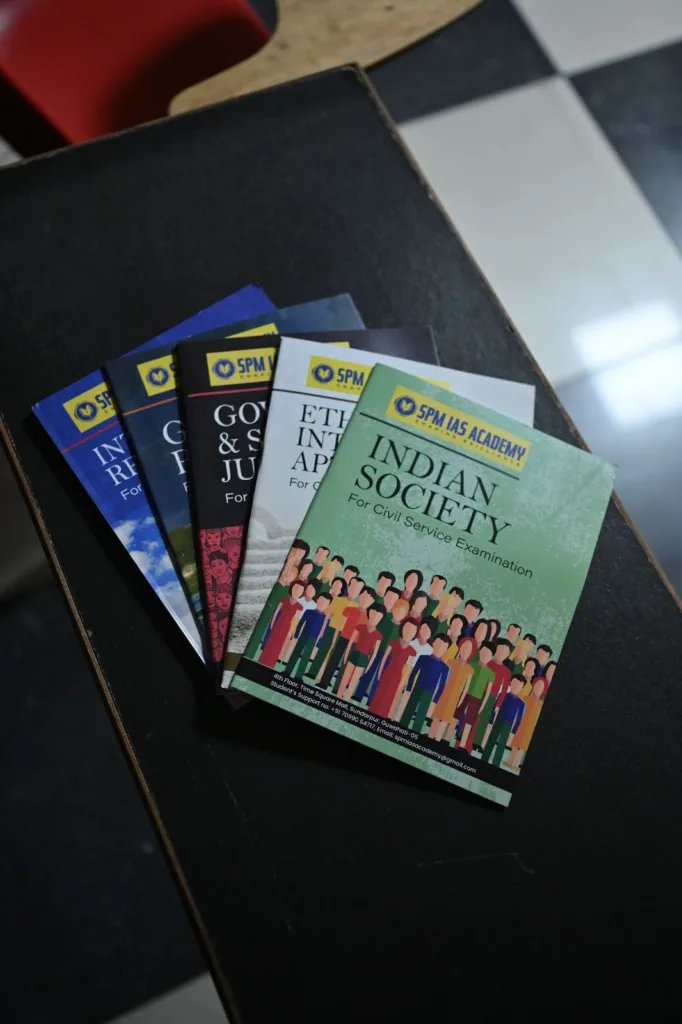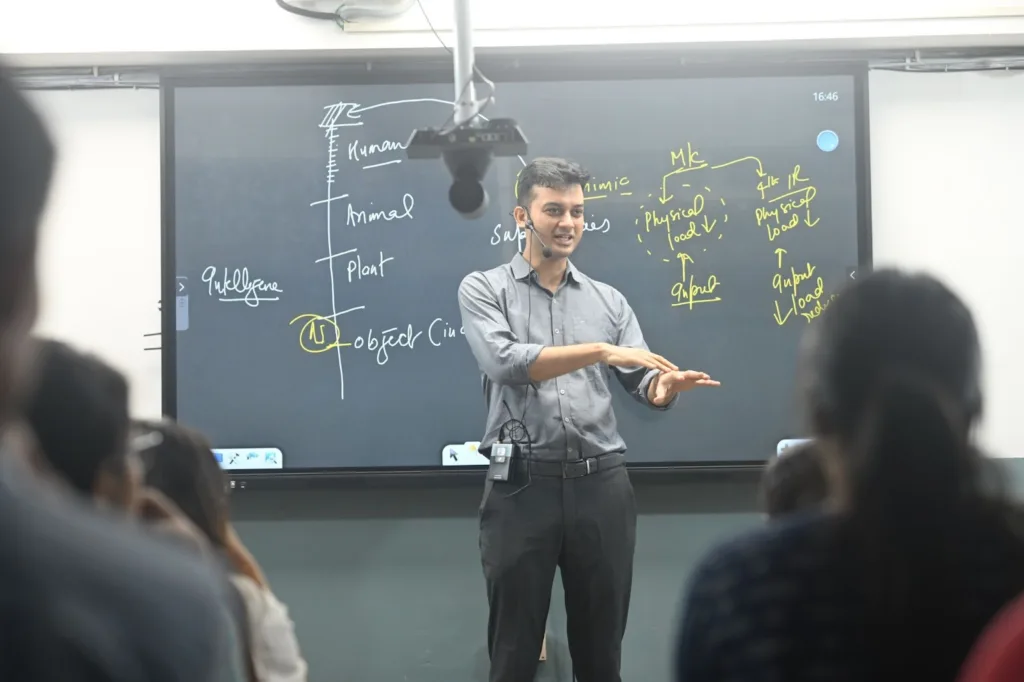When it comes to cracking the Assam Civil Services examination, a thorough understanding of the APSC Syllabus & Exam Pattern is essential. The Assam Public Service Commission (APSC) conducts the Combined Competitive Examination (CCE) to recruit officers for various administrative posts in the state. This year, APSC has released 262 vacancies, and aspirants across Assam have geared up to prepare with a structured and smart approach. As the prelims and Mains examination is already over, aspirants are now waiting for the official results. So, this article will help aspirants preparing for the upcoming year. Moreover, cracking APSC CCE is not just about hard work as it also demands conceptual clarity, current affairs awareness, and analytical answer writing, all built upon a strong foundation of syllabus mastery.
Check now – APSC result is out
Understanding the APSC Syllabus & Exam Pattern 2026

The APSC Syllabus & Exam Pattern is designed to evaluate both knowledge and administrative aptitude. The selection process includes three stages:
- First , the Preliminary Examination
- Second , the Mains Examination
- Third , Interview (Personality Test)
Therefore , aspirants must clear each stage to qualify for the next. Hence, it becomes vital to understand the detailed structure of the examination before beginning preparation.
| APSC Syllabus & Exam Pattern 2026 | |
| Organization Name | Assam Public Service Commission |
| Exam Name | APSC Combined Competitive Exam (CCE) exam 2025 |
| Category | Syllabus |
| Mode of Exam | Offline |
| Total Marks | Prelims-400Mains-1500 |
| Time Duration | Prelims- 2 hours per paperMains- 3 hours per paper |
| Selection Process | Prelims, Mains, Interview |
| Official Website | https://apsc.nic.in/ |
APSC Selection Process 2026
The APSC Syllabus & Exam Pattern ensures that candidates are evaluated across multiple parameters: general knowledge, analytical reasoning, and ethical judgment. The selection process follows this sequence:
- Prelims: Two papers (General Studies I and II) worth 200 marks each.
- Mains: Six papers totaling 1500 marks, including Essay, General Studies (I-IV), and General Studies of Assam.
- Interview: Conducted for 180 marks to assess the candidate’s personality, administrative aptitude, and communication skills.
APSC Prelims Exam Pattern 2026
The Prelims stage acts as a screening test and includes objective-type questions. The papers are as follows:
| APSC Prelims Exam Pattern 2025 | ||||
| Papers | Subjects | Total Questions | Total Marks | Time Duration |
| Paper-1 | General Studies I | 100 | 200 | 2 hours |
| Paper-2 | General Studies II | 80 | 200 | 2 hours |
| Total | 180 | 400 | 4 hours | |
Key Points:
- Firstly , each paper is of 2 hours duration.
- Second , there is a negative marking of 0.25 for each incorrect answer in GS I and 0.66 in GS II.
- Moreover , the questions test comprehension, analytical reasoning, and general awareness.
APSC Mains Exam Pattern 2026
The Mains Examination is descriptive in nature and requires deep conceptual understanding.
| Papers | Name of Paper | Total Marks | Time Duration |
| Paper 1 | Essay | 250 | 3 hours |
| Paper 2 | General Studies-I | 250 | 3 hours |
| Paper 3 | General Studies-II | 250 | 3 hours |
| Paper 4 | General Studies-III | 250 | 3 hours |
| Paper 5 | General Studies-IV | 250 | 3 hours |
| Paper 6 | General Studies of Assam | 250 | 3 hours |
| Total | 1500 | 18 hours | |
Detailed APSC Prelims Syllabus 2026

| Papers | Topics |
| General Studies I | Current events of national and international importance.History of India and Indian National Movement.Indian and World Geography: Physical, Social, and Economic Geography of India and the World.Indian Polity and Governance-Constitution, Political System, Panchayati Raj, Public Policy, Rights Issues, etc.Economic and Social Development-Sustainable Development, Poverty, Inclusion, Demographics, Social Sector Initiatives, etcGeneral issues on environmental ecology, biodiversity, and Climate change does not require subject specializationGeneral Science |
| General Studies II | Comprehension.Interpersonal skills, including communication skills.Logical reasoning and analytical ability.Decision-making and problem-solving.General mental ability.Basic numeracy (numbers and their relations, orders of magnitude, etc.) (Class X level), Data Interpretation (charts, graphs, tables, data sufficiency, etc.) (Class X level). |
Detailed APSC Mains Syllabus 2026
| Papers | Topics |
| Essay Writing | The topics of the essay will be given in the exam paper; candidates can choose any language, from English or Assamese. |
| General Studies I | Salient Features of India’s and the World’s Physical Geography.Distribution of key natural resources across the world (including South Asia and the Indian sub-continent); factors responsible for the location of primary, secondary, and tertiary sector industries in various parts of the world (including India).The Freedom Struggle – its various stages and important contributors/contributions from different parts of the country.Post-independence consolidation and reorganization within the country.Salient features of Indian Society, Diversity of India.Role of women and women’s organizations, population and associated issues, poverty and developmental Issues, urbanization, their problems, and their remedies.Effects of Globalization on Indian Society.Modern Indian history from about the middle of the eighteenth century until the present- significant events, personalities, issues.Social empowerment, Communalism, Regionalism & Secularism.Indian culture shall cover the salient aspects of Art Forms, Literature, and Architecture from ancient to modern times.Important Geophysical phenomena such as earthquakes, tsunamis, Volcanic activity, cyclones etc., geographical features and their location- changes in critical geographical features (including water-bodies and ice-caps) and in flora and fauna, and the effects of such changes. |
| General Studies II | Indian Constitution- historical underpinnings, evolution, features, amendments, significant provisions and basic structure.Functions and responsibilities of the Union and the States, issues and challenges about the federal structure, devolution of powers and finances up to local levels, and challenges therein.Separation of powers between various organs, dispute redressal mechanisms, and institutions.Comparison of the Indian constitutional scheme with that of other countries.Parliament and State Legislatures’ structure, functioning, and conduct of business, powers & privileges and issues arising out of these.Structure, organization, and functioning of the Executive and the Judiciary Ministries and Departments of the Government, pressure groups and formal/Informal associations and their role in the Polity.Salient features of the Representation of the People’s Act.Appointment to various Constitutional posts, powers, functions and responsibilities of various Constitutional Bodies. Statutory, Regulatory, and various Quasi-Judicial bodies.Government policies and interventions for development in various sectors and issues arising out of their design and implementation.”Development processes and the development industry: the role of NGOs, SHGs, various groups and associations, donors, charities, institutional, and other stakeholders.Welfare schemes for vulnerable sections of the population by the Center and States, and The performance of these schemes, mechanisms, laws, institutions, and bodies is constituted for the protection and betterment of these vulnerable sections.Issues relating to the development and management of the Social Sector/Services relating to Health, Education, Human Resources.Issues relating to the development and management of the Social Sector/Services relating to Health, Education, Human Resources, issues relating to poverty and hunger, with emphasis on Assam.Important aspects of governance, transparency, and accountability, e-governance-applications, models, successes,limitations, and potential; citizens’ charters, transparency & accountability, and institutional and other measures with emphasis on Assam.Role of civil services in a democracy.India and its neighborhood relations.Bilateral, regional, and global groupings and agreements involving India, affecting India’s interests.Effect of policies and politics of developed and developing countries on India’s interests, the Indian diasporaImportant International institutions, agencies, and forums: their structure and mandate |
| General Studies III | Indian Economy and issues relating to planning, mobilization of resources, growth, development and employment. Inclusive growth and issues arising from it.Government Budgeting.Major crops, cropping patterns in various parts of the country, different types of irrigation, and irrigation system, storage, transport, and marketing of agricultural produce, and issues and related constraints; e-technology in the aid of farmers.Issues related to direct and indirect farm subsidies and minimum support prices; Public Distribution System objectives, functioning, limitations, revamping; issues of buffer stocks and food security; Technology missions; economics of animal-rearing.Food processing and related industries in India- scope and significance, location, upstream and downstream requirements, supply chain management.Land reforms in India.Effects of liberalization on the economy, changes in industrial policy, and their effects on industrial growth.Infrastructure: Energy, Ports, Roads, Airports, Railways, etc.Investment models.Science and Technology- developments and their applications, and Effects in everyday life: Achievements of Indians in science & technology; Indigenization of technology and developing new technology. Indigenization of technology and developing new technology.Indigenization of technology and developing new technology.Awareness in the fields of IT, Space, Computers, robotics, Nano-technology, biotechnology, and issues relating to intellectual property rights.Conservation, environmental pollution, and degradation, environmental impact assessment.Disaster and disaster management with emphasis on Assam.Linkages between development and the spread of extremism.Role of external state and non-state actors in creating challenges to internal security.Challenges to internal security through communication networks, The role of media and social networking sites in internal security challenges, basics of cyber security; money laundering and its prevention.Security challenges and their management in border areas; linkages of organized crime with terrorism, with emphasis on Assam.Various Security forces and agencies and their mandate. |
| General Studies IV | Ethics and Human Interface- Essence, determinants and consequences of Ethics in human actions; dimensions of ethics; ethics in private and public relationships.Human Values lessons from the lives and teachings of great leaders, Reformers and administrators: the role of family, society, and educational institutions in Inculcating values.Attitude: content, structure, function; its influence and relation with thought and behavior; moral and political attitudes; social influence and persuasion.Aptitude and foundational values for Civil Service, Integrity, impartiality and non-partisanship, objectivity, dedication to public service, empathy, tolerance and compassion towards the weaker sections.Emotional intelligence concepts, their utilities, and applications in administration and governance.Contributions of moral thinkers and philosophers from India and the world.Public/Civil service values and Ethics in Public administration: Status and problems; ethical concerns and dilemmas in government and private institutions; laws, rules, regulations and conscience as sources of ethical guidance; accountability and ethical governance; strengthening of ethical and moral values in governance; ethical issues in international relations and funding; corporate governance.Probity in Governance: Concept of public service; Philosophical basis of governance and probity; Information sharing and transparency in government. Right to Information. Codes of Ethics, Codes of Conduct, CitizensCharters, Work culture, Quality of service delivery, Utilization of public funds, challenges of corruption.Case Studies on the above issues. |
| General Studies on Assam | History, Art, Culture, Literature, Tradition & Heritage of Assam. Major Landmarks in the History of Assam, Major Dynasties, their Administrative and Revenue systems, Socio-cultural Issues, Freedom Movement, Political Awakening, and Integration,Salient features of Architecture and Monuments, Arts, Painting,s and Handicrafts, Important Works of literature, Fairs, Festivals, Folk Music and Folk Dances, Culture, Tradition and Heritage, Religious Movements, and Leading Personalities.Geography of Assam: Broad physical features, Major physiographic divisions, Natural Resources of Assam, Climate, Natural Vegetation, Forests, Wildlife and Bio-diversity, Mines and Minerals, Population and Major Industries.Political and Administrative System of Assam Governor, Chief Minister, State Assembly, High Court, Assam Public Service Commission, District Administration, State Human Rights Commission, State Election Commission, State Information Commission, Public Policy, Legal Rights, and Citizen Charter.Economy of Assam: Macro overview of the Economy, Major Agricultural, Industrial and Service Sector Issues, Growth, Development and Planning, Infrastructure & Resources, Major Development Projects, Programs and Schemes- Government Welfare Schemes for SC/ST/Backward Class/Minorities/Disabled Persons, Destitute, Women, Children, Old Age People, Farmers & Laborers. Biodiversity, Environment, Security and Disaster Management with relevant emphasis on the State of Assam. |
How SPM IAS Academy Helps You to Master APSC Syllabus & Exam Pattern

When it comes to structured preparation for the exam and mastering APSC Syllabus & Exam Pattern, SPM IAS Academy provides one of the most disciplined and analytical training environments in Assam.
Students benefit from:
- Firstly , the daily Newspaper Analysis by Satyajit Sir, helping connect current affairs with syllabus topics.
- Secondly , Assampedia by Chinmoy Sir, offering deep insights into state-specific GS.
- Moreover , there is “ Asom Bisesh ” by Abhisekh Lashkar Sir, simplifying complex socio-political and historical aspects of Assam.
- Geography by Mridul Sir, known for concept-based teaching and visual map learning.
- Also , we have weekly Mock Tests simulating real APSC exam pressure.
- Daily MCQ Practice Tests to strengthen Prelims preparation.
- Aspirants will also get mains Answer Writing Sessions to improve analytical expression and content structuring.
- Lastly , our One-to-One Mentorship which ensures personalized guidance for every student’s strengths and weaknesses.
Hence , at SPM IAS Academy, strategy meets consistency. Every aspirant is trained to not just clear but excel in every stage for mastering APSC Syllabus & Exam Pattern.
Conclusion
Mastering the APSC Syllabus & Exam Pattern requires not only dedication but also direction. A clear understanding of each paper, consistent answer writing, and a disciplined study routine can transform an aspirant into a confident candidate. Hence , with structured guidance from SPM IAS Academy and mentorship from subject experts, aspirants can effectively navigate their journey towards success in the Assam Civil Services Examination 2025.
FAQs on APSC Syllabus & Exam Pattern 2026
The APSC CCE 2025 consists of three stages: Preliminary Examination, Mains Examination, and Interview.
Each paper in the Prelims, General Studies I and II, has a duration of 2 hours.
There are six papers in the Mains Examination, totaling 1500 marks.
Yes, “General Studies of Assam” is a dedicated paper covering Assam’s history, geography, and socio-economic issues.
SPM IAS Academy helps aspirants with daily newspaper analysis, weekly mock tests, daily MCQs, answer writing sessions, and one-to-one mentorship making it one of the most comprehensive platforms for APSC preparation in Assam.












